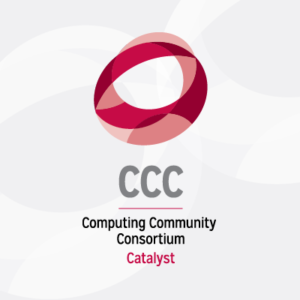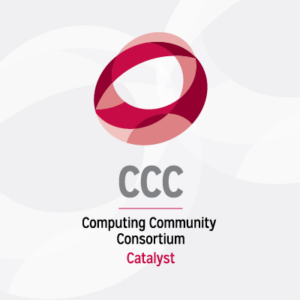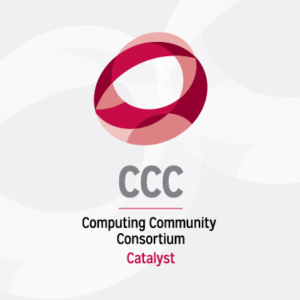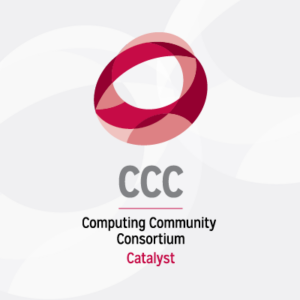In 2023, the Society for Industrial and Applied Mathematics (SIAM), an affiliated professional society member of CRA, commissioned a task force to craft a strategic vision for arising challenges in the future of computational science. Earlier this month, the task force released its report, titled The Future of Computational Science. CCC is excited to highlight the importance and timeliness of this report in which many themes are confirmed by our visioning activities and reports.
As cited in the report, the United States was the unquestioned leader in advanced computing and computational science. The task force states that in recent years that leadership has been challenged by strategic rivals. The Future of Computational Science report was created to address ways of overcoming significant challenges to ensure continued U.S. leadership.
This report emphasizes the increasing importance of interdisciplinary collaboration. Breakthroughs in computational science often arise from the collaboration between experts from diverse domains, which fosters innovation and drives progress.
Nurturing the next generation of computational scientists is also essential for sustaining progress in the computing field. There should be robust educational programs and workforce development initiatives to equip future generations with the skills needed to tackle emerging challenges.
Other items highlight the ethical implications of computational research, advocating for responsible practices, transparency, and accountability to ensure that technological advancements benefit society as a whole.
Innovation and discovery, societal impact, and global challenges
Several areas in this report shine light on three points:
Innovation and Discovery: By fostering interdisciplinary collaboration and embracing emerging technologies, computational scientists can unlock new frontiers of knowledge and drive innovation across various domains.
Societal Impact: As computational science continues to advance, its impact on society will only grow. Ethical considerations must be prioritized to ensure that technological advancements are established responsibly and equitably.
Global Challenges: From climate change to healthcare to cybersecurity and beyond, computational science has a vital role to play in addressing global challenges. By leveraging computational tools and techniques, researchers can develop solutions to complex problems that affect humanity as a whole.
Key findings in the report include:
- Computing researchers and funding agencies should focus on establishing more comprehensive computational science programs. This means dedicating funds, personnel, and infrastructure to support scientific research and problem-solving using computational methods. One program includes The Department of Energy’s (DOE) Exascale Computing Project, located at the Oak Ridge National Laboratory. This project seeks to prepare scientists and computing facilities for exascale, a level of supercomputing capable of at least one exaFLOPS floating point calculations per second to support expansive workloads. To fully utilize ECP technology and future hardware, the program must make advances in both applied mathematics and computer science. This could involve developing algorithms, numerical methods, and software tools optimized for high-performance computing environments.
- In addition to leveraging current advancements, the Exascale Computing Program should anticipate and prepare for future developments in high-performance computing. This includes investing in research and development to capitalize on upcoming hardware improvements. Collaboration is emphasized as essential for success. The program should foster partnerships between applied mathematicians, computer scientists, and application scientists. This multidisciplinary approach ensures that computational solutions are effectively tailored to address critical national challenges across various domains.
- The nation requires a comprehensive set of investments to guarantee the sustained advancement of high-performance computing technologies. It is important not only to achieve exascale computing, but also ensure that the development of such capabilities extends further to meet the nation’s ongoing and changing requirements in the field of advanced computational science.
- Investing in alternative computing technologies like neuromorphic and quantum computing are essential to address significant challenges in the future that conventional computer architectures may not be able to. Neuromorphic computing is inspired by the structure and functioning of the human brain. It aims to develop computer systems that mimic the brain’s neural networks, allowing for more efficient and flexible processing of information, particularly in tasks related to pattern recognition, learning, and adaptation. Quantum computing utilizes the principles of quantum mechanics to perform computations. Quantum computers have the potential to solve certain types of problems exponentially faster than classical computers, particularly in areas such as cryptography, optimization, and simulation.
- As technology advances, scientific instruments and facilities are generating increasingly large and complex datasets. To continue advancing, scientists will need access to these vast amounts of data. However, doing so will require significant investments in infrastructure, resources, and technology to effectively collect, manage, analyze, and interpret these data streams.
- Artificial intelligence and machine learning have significant potential to revolutionize scientific research processes. These technologies can enhance various aspects of research, including data analysis, pattern recognition, and hypothesis generation. However, fully realizing these opportunities will require substantial investments in mathematics and computing.
Intersection with recent CCC initiatives
This report reinforces some of the topics the CCC is interested in or working on such as the Full Stack Task Force. This task force focuses on everything that goes into a computer system, and how these technologies interface with users and developers. Conversations around exascale computing, quantum and neuromorphic computing are among the many discussions in the group. In fact, one of the Full Stack Task Force members, Bill Gropp at the University of Illinois in Urbana-Champaign, serves on CCC’s council and is an expert in exascale computing where he is working on this technology.
Events like The Community Driven Approaches to Research in Technology & Society (CDARTS) workshop share similar goals as this report to bring researchers in computing and the communities affected by the impacts of AI systems together. The CDARTS workshop tackled how computing research can support their needs and best practices for collaboration.
CCC has also just finished a 6-roundtable series on establishing interdisciplinary best practices for computing research, which is relevant to the numerous mentions in the report about the urgent need for cross-disciplinary collaborations. CCC will be releasing a joint report with CRA on the topic in the coming months.
CRA and SIAM are connected in many ways. SIAM Task Force Chair Bruce Hendrickson from Lawrence Livermore National Laboratory was just elected to CRA’s Board. Mary Hall, director of the School of Computing at the University of Utah, has also served on the task force and is on the CRA Board, while serving on CRA’s Executive Committee. Read the full SIAM Task Force report here.
- SEO Powered Content & PR Distribution. Get Amplified Today.
- PlatoData.Network Vertical Generative Ai. Empower Yourself. Access Here.
- PlatoAiStream. Web3 Intelligence. Knowledge Amplified. Access Here.
- PlatoESG. Carbon, CleanTech, Energy, Environment, Solar, Waste Management. Access Here.
- PlatoHealth. Biotech and Clinical Trials Intelligence. Access Here.
- Source: https://feeds.feedblitz.com/~/874676597/0/cccblog~New-SIAM-Report-Explores-the-Challenges-Facing-the-Future-of-Computational-Science/
- :has
- :is
- :not
- :where
- 1
- 2023
- 7
- a
- Able
- About
- access
- accountability
- Achieve
- across
- activities
- adaptation
- addition
- address
- addressing
- advance
- advanced
- advancement
- advancements
- advances
- advancing
- advocating
- affect
- affected
- Affiliated
- agencies
- AI
- AI systems
- aims
- algorithms
- Allowing
- also
- alternative
- among
- amounts
- an
- analysis
- analyze
- and
- and infrastructure
- anticipate
- Application
- applied
- approach
- approaches
- architectures
- ARE
- areas
- arise
- arising
- around
- AS
- aspects
- At
- BE
- been
- benefit
- BEST
- best practices
- between
- Beyond
- Bill
- Blog
- board
- both
- Brain
- breakthroughs
- bring
- Bruce
- but
- by
- calculations
- CAN
- capabilities
- capable
- capitalize
- ccc
- CCC Blog
- certain
- Chair
- challenged
- challenges
- change
- changing
- cited
- Climate
- Climate change
- collaboration
- collaborations
- collect
- coming
- committee
- Communities
- community
- Community Driven
- complex
- comprehensive
- computational
- computations
- computer
- computer science
- computers
- computing
- computing research
- CONFIRMED
- connected
- considerations
- continue
- continued
- continues
- conventional
- conversations
- could
- Council
- CRA
- craft
- created
- critical
- cryptography
- Current
- Cybersecurity
- data
- data analysis
- datasets
- Department
- develop
- developers
- developing
- Development
- developments
- Director
- discovery
- discussions
- diverse
- doe
- doing
- domains
- drive
- driven
- drives
- Earlier
- educational
- effectively
- efficient
- embracing
- emerging
- emerging technologies
- emphasized
- emphasizes
- enhance
- ensure
- ensures
- environments
- equip
- essential
- established
- establishing
- ethical
- everything
- Exascale
- Exascale Computing
- excited
- executive
- expansive
- expert
- experts
- explores
- exponentially
- extends
- facilities
- facing
- fact
- faster
- field
- findings
- flexible
- floating
- Focus
- focuses
- For
- Force
- Foster
- fostering
- fosters
- from
- Frontiers
- full
- Full Stack
- fully
- functioning
- funding
- funds
- further
- future
- future developments
- generating
- generation
- generations
- Global
- Goals
- Goes
- Group
- Grow
- guarantee
- Hall
- Hardware
- Have
- he
- healthcare
- high-performance
- Highlight
- How
- However
- HTTPS
- human
- Humanity
- illinois
- Impact
- Impacts
- implications
- importance
- important
- improvements
- in
- include
- includes
- Including
- increasing
- increasingly
- industrial
- information
- Infrastructure
- initiatives
- Innovation
- inspired
- instruments
- Intelligence
- interested
- Interface
- into
- investing
- Investments
- involve
- IT
- items
- ITS
- joint
- just
- knowledge
- laboratory
- large
- lawrence
- leader
- Leadership
- learning
- least
- Level
- leveraging
- light
- like
- located
- machine
- machine learning
- make
- manage
- many
- mary
- mathematics
- May..
- means
- mechanics
- Meet
- member
- Members
- mentions
- methods
- Month
- months
- more
- more efficient
- multidisciplinary
- must
- nation
- National
- Nations
- Need
- needed
- needs
- networks
- neural
- neural networks
- neuromorphic computing
- New
- next
- numerous
- oak
- Oak Ridge National Laboratory
- of
- often
- on
- ONE
- ongoing
- only
- opportunities
- optimization
- optimized
- or
- our
- overcoming
- particularly
- partnerships
- Pattern
- per
- Perform
- Personnel
- plato
- Plato Data Intelligence
- PlatoData
- Play
- Point
- points
- potential
- practices
- Prepare
- principles
- prioritized
- problem-solving
- problems
- processes
- processing
- professional
- Program
- Programs
- Progress
- project
- Quantum
- quantum computers
- quantum computing
- Quantum Mechanics
- Read
- realizing
- recent
- recognition
- reinforces
- related
- released
- releasing
- relevant
- report
- Reports
- require
- Requirements
- requires
- research
- research and development
- researchers
- Resources
- responsible
- responsibly
- revolutionize
- rivals
- robust
- Role
- s
- School
- Science
- scientific
- scientists
- Second
- Seeks
- Series
- served
- serves
- serving
- set
- Share
- shine
- should
- siam
- significant
- similar
- simulation
- skills
- So
- societal
- Society
- Software
- Solutions
- SOLVE
- some
- stack
- States
- Strategic
- streams
- structure
- substantial
- success
- such
- Supercomputing
- support
- system
- Systems
- tackle
- tailored
- Task
- task force
- tasks
- techniques
- technological
- Technologies
- Technology
- than
- that
- The
- The Future
- their
- themes
- There.
- These
- this
- three
- titled
- to
- together
- tools
- topic
- Topics
- Transparency
- types
- u.s.
- United
- United States
- university
- unlock
- upcoming
- urgent
- users
- using
- utah
- utilize
- utilizes
- various
- Vast
- vision
- vital
- was
- ways
- which
- while
- whole
- will
- with
- Workforce
- Workforce Development
- working
- workshop
- years
- zephyrnet













